The Wish4Life Foundation implements its aid programs in order to address the human side of cancer care. It is critical that we restore the spontaneity and dignity of children while treating their cancer. The empowerment of children through providing tools for education and for play is an example of one of our programs.
While providing material aid and resources is an important objective, establishing partnerships for training and empowering local healthcare professionals is an essential part of the Foundation’s outreach. These partnerships are developed in reciprocity with healthcare workers and patients to ensure that the programs respect the culture of the people while addressing urgent areas of concern. A key aspect of these efforts is hands-on work within the local communities, performed in accordance with the Foundation’s central philosophy of intellectual philanthropy. The ultimate goal is to perpetuate a high quality and self-sustaining system of cancer care.
The initial efforts of the Wish4Life Foundation will center on projects to enhance medical education, provide important healthcare services, and empower cancer patients. By operating within this framework, the Foundation will improve both the quality of care and the long-term livelihood of the people. The projects are intended to effectively allocate resources to address multiple facets of cancer care at the same time, ensuring that the Foundation is able to help as many people as possible.
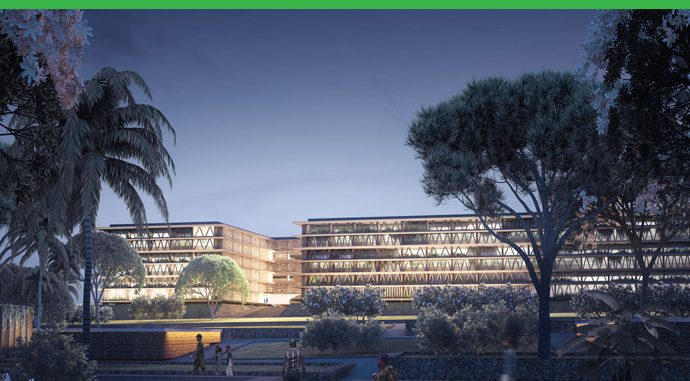
The Wish4Life Foundation in partnership with one of the world's leading architectural firms, Adjaye Associates, has developed a model concept of a pediatric cancer center that will insure that children of Africa with cancer have access to the same quality of care as children in the West. Designed in accordance with Western standards, the new hospital will promote the dignity and elevate the spirits of the children and families who are undergoing treatment for cancer while vastly improving their chances for survival. The Foundation has identified an ideal location for the Center in Kyebi, Ghana, whose government has approved the model.
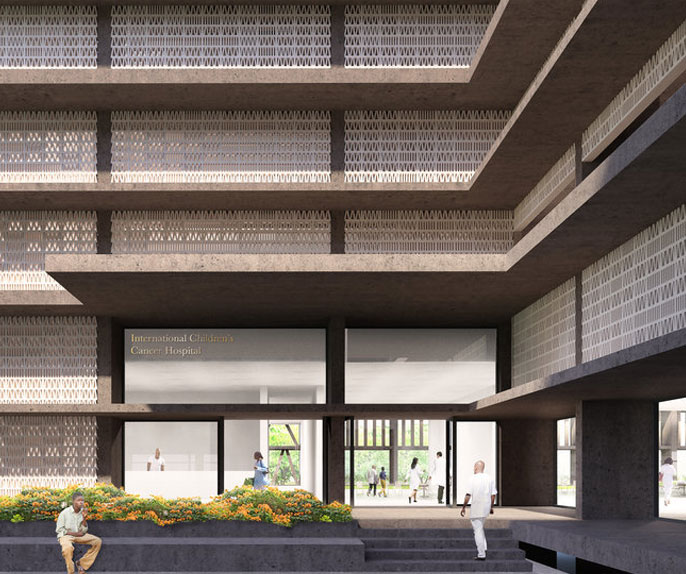
The Hospital is designed to meet high international standards for delivery of quality cancer care which translates to enhanced capacity to cure.
The International Children's Cancer Research Centre will include an innovatively designed and constructed 100 bed hospital and outpatient cancer clinic that will deliver state-of the art cancer care. The model integrates the African culture of the region in its design, enhances the power grid of the locale by utilizing sustainable energy resources (solar powered or a hybrid to reduce operating costs for electricity over time), and creates a soothing, open and restful environment for treatment that promotes healing and recovery for children with cancer and their families. Key areas of excellence will include state-of-the art suites in radiology (including CT, MRI, ultrasound, and nuclear medicine capability), radiation oncology, pharmacy (meeting international standard for sterility), operating suites (3-4 suites), pathology and intensive care.
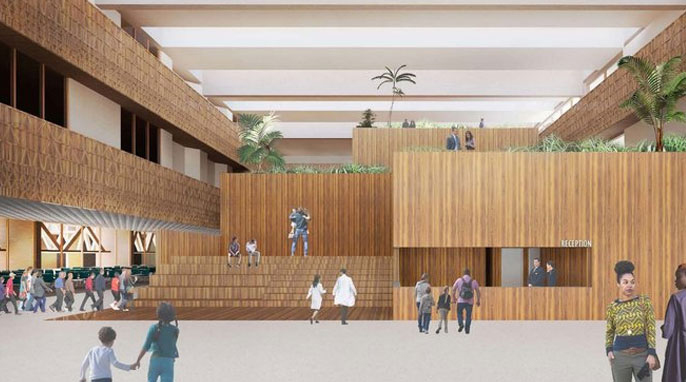
Nourishing food for patients and their families and housing for children, their families and Hospital staff will be provided on the Hospital campus. Training in food safety and preparation will take place in training kitchens and cafeterias embedded in the Hospital facilities. Outreach to local community leaders and farmers will insure an ongoing supply of food to support children with cancer and their families.
Many hospitals in developing countries lack certain benefits that are common in developed countries such as clean water and healthy food. This is especially important in the treatment of youths with cancer, as patients undergoing chemotherapy have limited diets. Dirty water can serve as a vector for infection. Food is often insufficiently nutritious; in some cases, the hospital may not have sufficient food for the patients, leaving them dependent on charitable contributions that still fail to cover their dietary needs. The patients’ families also have few food options: the only places to purchase food are the hospital canteen, nearby vendors, and restaurants. Unfortunately, the prices are too high for poorer families. The scarcity of food at the hospitals often compounds preexisting malnutrition and can prove detrimental to cancer treatment.
69% of the children being treated for cancer received one meal or less per day while staying at University of Kigali Teaching Hospital (CHUK), while 65% of the caregivers only ate one meal or less a day.
84% of the children received meat less than once a week; moreover, the meals were unbalanced and inadequate in meeting the nutritional needs of children.
68% of the caregivers felt their children already had an underlying malnutrition problem, while 67% of the caregivers felt that they themselves had an underlying malnutrition problem.
One of the Foundation’s objectives is to improve the availability of food for cancer patients so that they can receive the nutrition they need while undergoing treatment.
ONE WORLD ONE KITCHEN is a new program created by Dr. Tanya Trippett, President of the Eugène Gasana Jr. Foundation, and Nic Cortese of US Foods, to address the challenge of malnutrition in children with cancer who are hospitalized in developing nations where there is no organized food program or cafeteria and where parents lack the financial means to provide subsistence and pay for the cost of healthcare.
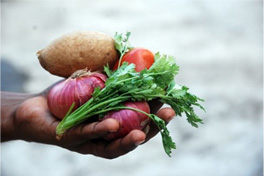
NOURISH TO CURE

TRAIN TO NOURISH

SUSTAIN TO NOURISH
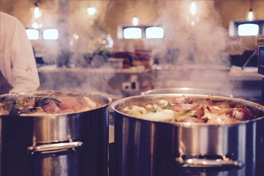
BUILD TO NOURISH
In February 2014, the Foundation in collaboration with the Sean Hanna Foundation and a local NGO, Solid Africa, provided a grant to donate a year’s supply of fruit to the pediatric ward at University of Kigali Teaching Hospital (CHUK). Fruits such as apples and oranges are some of the only foods that children undergoing chemotherapy can eat. Moreover, these fruits provide vital nutrients. This grant has been maintained as a renewable grant on an annual basis to ensure that patients receive vital nutritional support. The program will be augmented to include bottled water, milk, sorghum, eggs, and chicken.
All of our programs are designed to empower patients and their families. Young cancer patients in developing countries often do not receive resources to meet their emotional needs while adapting to the hospital environment. While awaiting treatment that can last for weeks or even months, there are limited resources for play and education to help divert their focus from their illness and the suffering it may cause. Some may even question whether their lives are worthwhile.
By empowering patients undergoing care, the Foundation hopes to improve their lives both within the hospital and during the recovery process from their illness. The Foundation believes that the latter two objectives can be addressed together to some degree: patients in the hospital for extended periods have plenty of time to acquire new knowledge that can be used to better their own lives and those of the African people as a whole.

Campaign in Support of
Mothers

Pediatric Hat Program

Education of Pediatric Patients